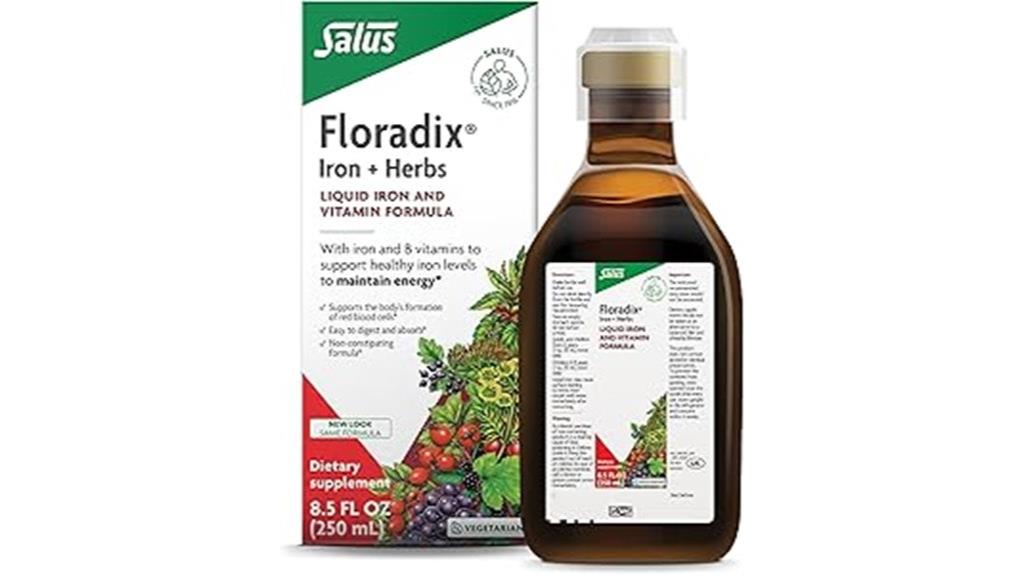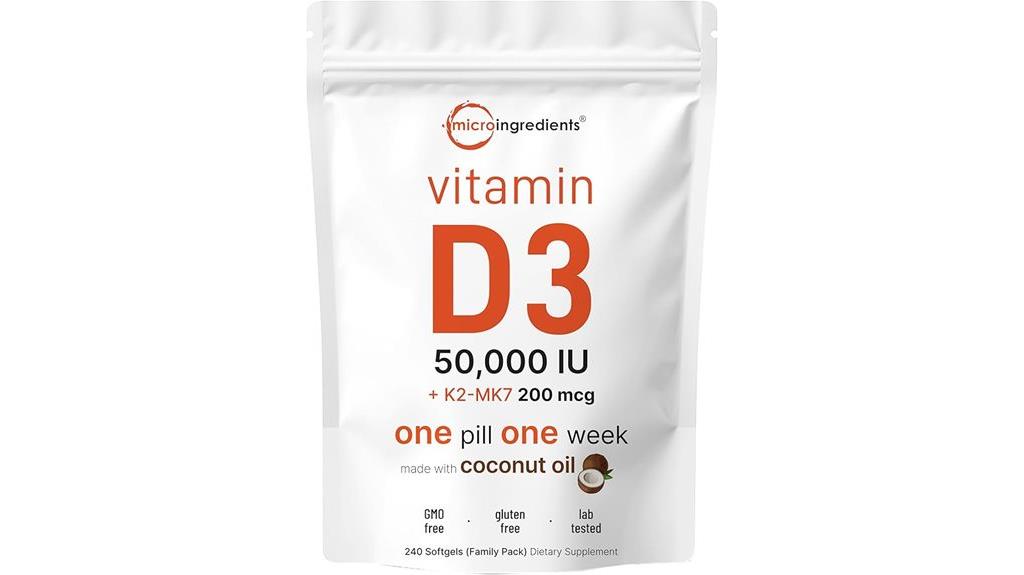Just as Cleopatra, the legendary African queen, was known for her beauty regimens, modern Black women can harness the power of essential vitamins to enhance their health and vitality. You've probably heard about the importance of a balanced diet, but did you know that certain vitamins are particularly important for Black women's well-being? From boosting energy levels to supporting bone strength and heart health, these key nutrients play a significant role in your overall wellness. If you're curious about which multivitamins you should be incorporating into your daily routine, you're in for some eye-opening information that could transform your approach to self-care.
Vitamin D for Bone Health
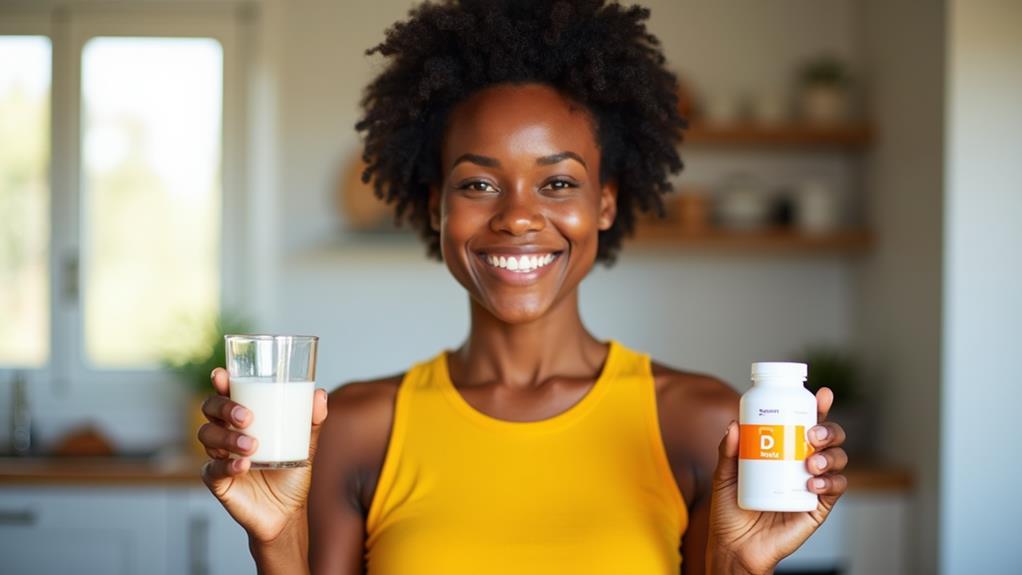
Three key factors make vitamin D particularly important for Black women's bone health. First, melanin in darker skin reduces vitamin D production from sunlight exposure.
Second, Black women are at higher risk for vitamin D deficiency due to lower dietary intake.
Third, they often have decreased vitamin D absorption efficiency.
Vitamin D is essential for calcium absorption and bone mineralization. Without adequate levels, you're at increased risk for osteoporosis, fractures, and other bone-related issues.
To maintain ideal bone health, you should aim for 600-800 IU of vitamin D daily.
While sunlight is a primary vitamin D source, it's often insufficient for Black women.
Consider incorporating vitamin D-rich foods into your diet, such as fatty fish, egg yolks, and fortified dairy products. However, dietary sources alone may not meet your needs.
Supplementation is often necessary to achieve ideal vitamin D levels. Look for a multivitamin containing vitamin D3, which is more effectively absorbed than D2.
Regular blood tests can help you monitor your levels and adjust supplementation as needed. Consult your healthcare provider to determine the most appropriate dosage for your individual needs.
Iron for Energy Boost

Iron deficiency anemia is a common concern for Black women, affecting their energy levels and overall well-being. This condition occurs when your body lacks sufficient iron to produce hemoglobin, the protein in red blood cells that carries oxygen throughout your body.
As a Black woman, you may be at higher risk due to factors like heavy menstrual periods, pregnancy, or dietary choices.
To boost your iron levels and combat fatigue, consider incorporating iron-rich foods into your diet. Good iron sources include lean red meat, poultry, fish, beans, lentils, and dark leafy greens.
However, it's essential to recognize that your body absorbs iron from animal sources (heme iron) more efficiently than from plant sources (non-heme iron).
To enhance iron absorption, pair iron-rich foods with vitamin C sources like citrus fruits, bell peppers, or tomatoes.
Conversely, avoid consuming calcium-rich foods or drinks with iron, as calcium can inhibit iron absorption.
If dietary changes aren't sufficient, consult your healthcare provider about iron supplements. They can determine the appropriate dosage based on your specific needs and help monitor your iron levels to guarantee maximum energy and health.
Calcium for Strong Bones

While iron is essential for energy, calcium plays a key role in maintaining strong bones and teeth. As a Black woman, you may be at higher risk for calcium deficiency due to factors like lactose intolerance and darker skin pigmentation, which can affect vitamin D synthesis and calcium absorption.
To guarantee you're getting enough calcium, focus on incorporating calcium-rich foods into your diet. Excellent calcium sources include dairy products, leafy greens like kale and collard greens, and fortified plant-based milk alternatives. If you're lactose intolerant, opt for lactose-free dairy products or calcium-fortified options.
Calcium absorption is enhanced when paired with vitamin D, so consider spending time outdoors or taking a vitamin D supplement. Additionally, weight-bearing exercises can help strengthen your bones and improve calcium uptake.
It's important to note that excessive calcium intake can interfere with iron absorption, so space out your calcium and iron supplements. Aim for the recommended daily intake of 1000-1200mg of calcium, depending on your age.
If you're concerned about your calcium levels, consult your healthcare provider for personalized advice and potential supplementation options.
B-Complex for Metabolism Support
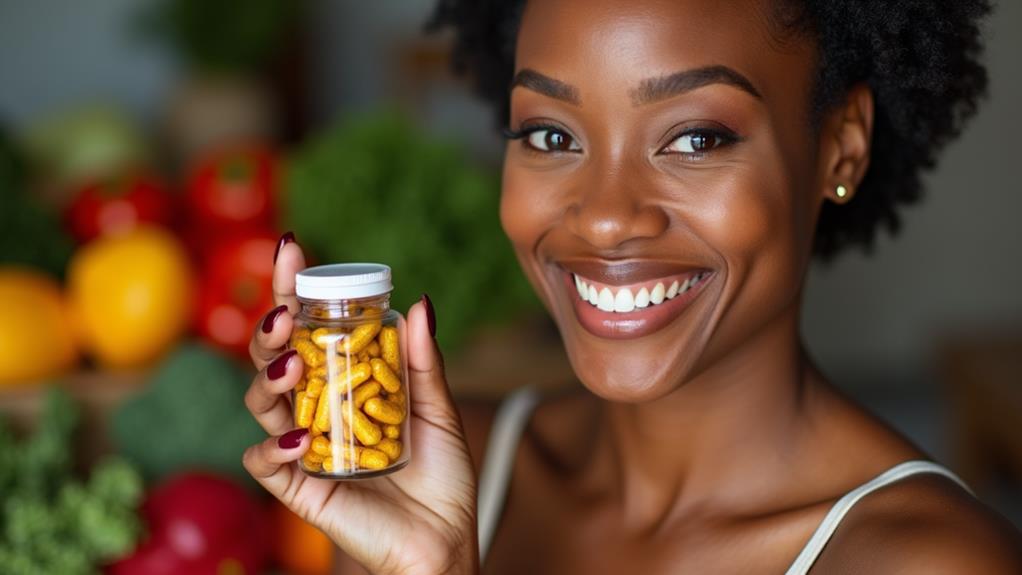
B-complex vitamins play an essential role in supporting metabolism and overall health for Black women. This group of eight water-soluble vitamins works synergistically to provide numerous B complex benefits, including metabolism enhancement and energy production.
By facilitating the conversion of food into usable energy, B vitamins help maintain ideal cellular function and support your body's daily processes.
As a Black woman, you may benefit from increased B vitamin intake due to potential genetic variations affecting nutrient absorption. These vitamins are important for maintaining a healthy nervous system, promoting stress reduction, and contributing to mood stabilization. B6, B9 (folate), and B12 are particularly significant for neurotransmitter production and regulation.
Additionally, B vitamins aid in the metabolism of proteins, fats, and carbohydrates, ensuring efficient nutrient absorption throughout your body. This process is critical for maintaining stable energy levels and supporting overall metabolic health.
Incorporating a B-complex supplement into your daily routine can help address potential deficiencies and enhance your body's metabolic functions, ultimately contributing to improved energy, mood, and overall well-being.
Omega-3 for Heart Protection
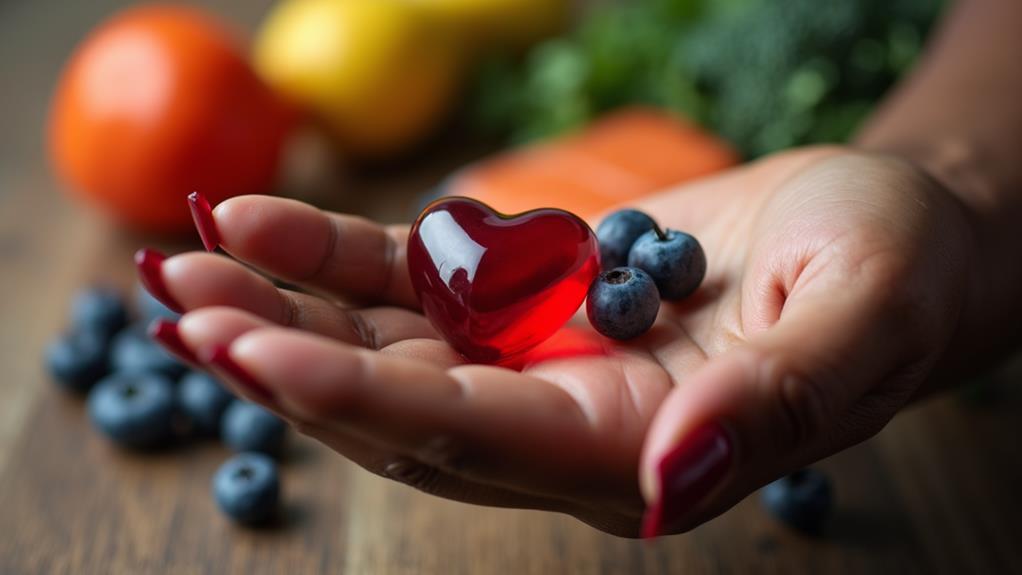
As a vital component of heart health for Black women, omega-3 fatty acids play an important role in protecting cardiovascular function. You'll find that these polyunsaturated fats can help reduce inflammation, lower blood pressure, and decrease triglyceride levels.
Research indicates that omega-3s may also help prevent arrhythmias and slow the buildup of plaque in your arteries. For Black women, who face higher risks of heart disease, incorporating omega-3s into your diet is essential.
You can obtain these beneficial fats from various omega sources, including fatty fish like salmon, mackerel, and sardines. If you're not a fan of fish, you might take into account plant-based options such as flaxseeds, chia seeds, and walnuts. However, these plant sources contain a different type of omega-3 (ALA) that your body must convert to EPA and DHA, which isn't as efficient.
To make certain you're getting enough omega-3s for heart protection, you might want to take into account a high-quality fish oil or algae-based supplement. Aim for a daily intake of 250-500mg of combined EPA and DHA.
Always consult with your healthcare provider before starting any new supplement regimen, especially if you're taking blood-thinning medications.
Folate for Reproductive Health

In light of reproductive health concerns, folate stands out as an essential nutrient for Black women. This B vitamin plays a significant role in preventing neural tube defects during fetal development and supports overall reproductive health.
Studies have shown that Black women are at higher risk of folate deficiency, which can lead to complications during pregnancy and increase the likelihood of birth defects.
To guarantee adequate folate intake, you should aim for 400 micrograms daily, with higher doses recommended during pregnancy. Folate sources include leafy greens, legumes, and fortified grains.
However, dietary intake alone may not be sufficient, making supplementation necessary. Many multivitamins designed for women contain folic acid, the synthetic form of folate, which is easily absorbed by your body.
It's important to note that some women may have difficulty metabolizing folic acid due to genetic variations. In these cases, your healthcare provider might recommend methylfolate, an active form of folate that's more readily utilized by your body.
Regular folate supplementation can help prevent anemia, support cell division, and contribute to overall reproductive health, making it a critical component of your nutritional regimen.
Antioxidants for Immune Function

Moving from reproductive health to overall wellness, antioxidants play a key role in supporting immune function for Black women. Antioxidants are compounds that protect your cells from damage caused by free radicals, which can weaken your immune system over time.
As a Black woman, you may benefit from increased antioxidant intake due to higher oxidative stress levels often associated with environmental and social factors.
Key antioxidant sources for immune support include vitamins C and E, beta-carotene, and selenium.
Vitamin C, found in citrus fruits and leafy greens, enhances the production and function of white blood cells.
Vitamin E, present in nuts and seeds, protects cell membranes from oxidative damage.
Beta-carotene, abundant in orange and yellow vegetables, supports the skin's barrier function, your body's first line of defense.
Selenium, found in Brazil nuts and seafood, helps regulate immune responses.
When choosing a multivitamin, look for one that contains these essential antioxidants.
However, it's crucial to acknowledge that while supplements can help, they shouldn't replace a balanced diet rich in fruits, vegetables, and whole grains, which naturally provide a wide array of antioxidants for peak immune function.
Conclusion
You're now equipped with a roadmap to ideal health. Like a well-oiled machine, your body needs the right fuel to function at its best. By incorporating these essential multivitamins into your daily routine, you're taking charge of your wellbeing. Remember, these supplements aren't magic bullets, but they're powerful tools in your health arsenal. Pair them with a balanced diet and regular exercise, and you'll be paving the way for a healthier, more vibrant you.
Join The Discussion
What vitamins and supplements have made a difference in your health routine? Share your experiences and tips with the community to inspire others in their wellness journey.

Empower your health journey with these essential supplements, thoughtfully curated to meet the unique needs of Black women.





